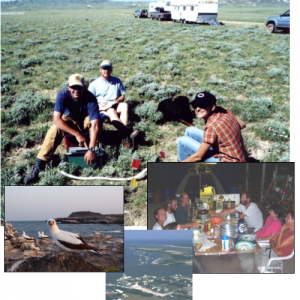Much of the ecological and evolutionary research of the Biology Department occurs off-campus, some at nearby sites and some in remote places. Studies of honey bee neurobiology require numerous hives, which we maintain on a rural property just outside Winston-Salem. Plant physiologists travel regularly to the North Carolina barrier islands and beaches to work on photon harvesting by dune plants. Population geneticists sample beetle and salamander squirrel throughout the Appalachians to our west, and bat biologists spend the summer in the Chiricahua Mountains in Arizona. Internationally, plant biologists travel the globe for genetic samples from blueberries and related species; ecologists conduct long-term research on grass and grazers in Africa; plant ecologists continue studies of climate change and plant communities in the Andes and Amazon of Peru; and the Anderson laboratory studies seabirds in the Galapagos Islands. Wake Forest researchers and classes have recently begun studies on Lighthouse Reef Atoll, a pristine marine environment in the Caribbean about 50 miles off the coast of Belize. Our two newest faculty members have research sites at the Smithsonian Tropical Research Institute in Panama and the Bamfield Marine Sciences Centre in British Columbia.
